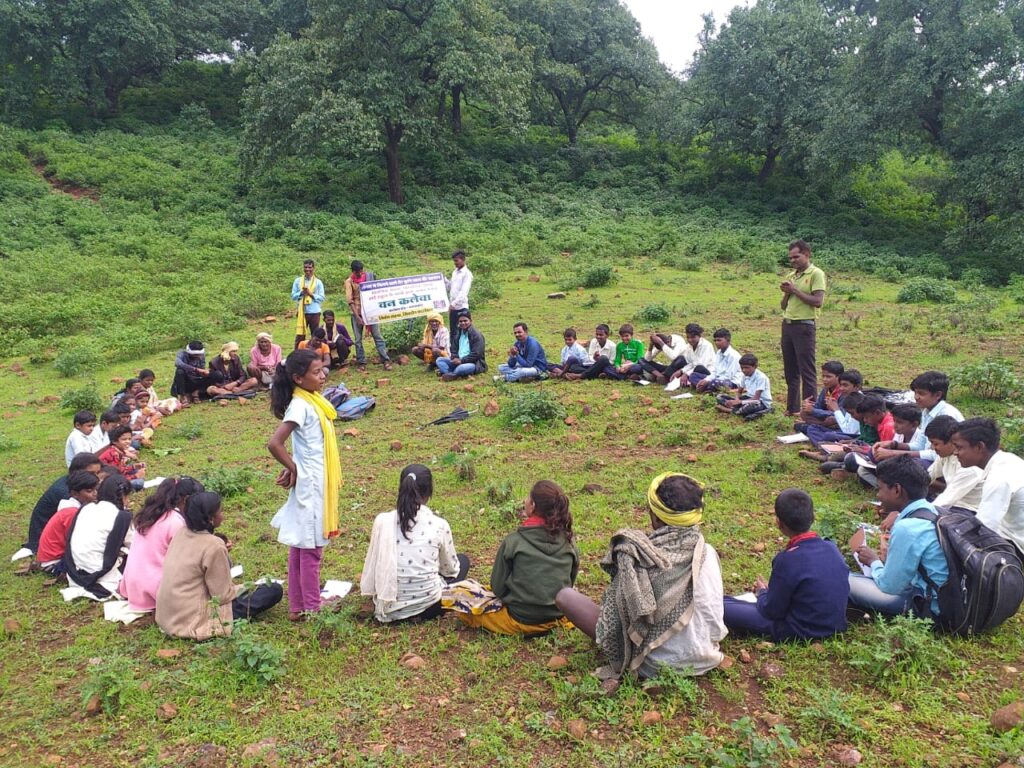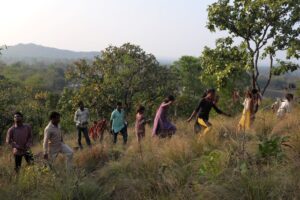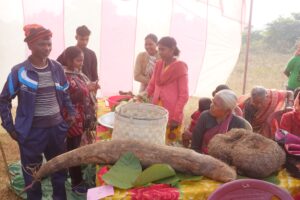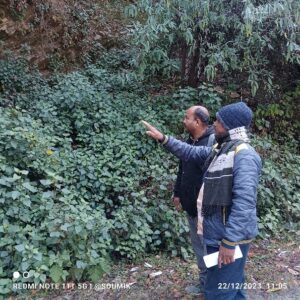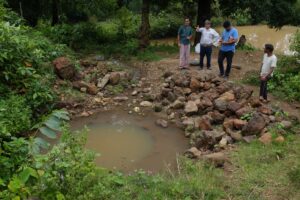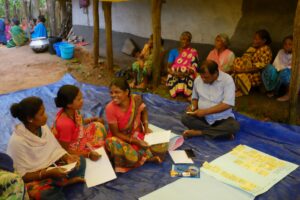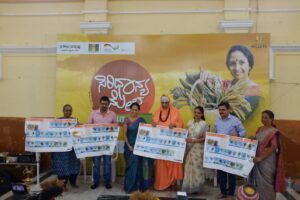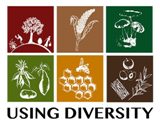Naresh Biswas
The Using Diversity Network project is being implemented by Nirman in the villages of Patalkot. This project is being implemented in collaboration with Keystone Foundation. As a part of the Using Diversity project on the 30th of July a “Van Kaleva” program was organized in Kala Pahar Forest.

Around 50 male and female students from Primary and Middle schools of Karrapani, Satalvah, Sidhhauli and Aamdhana villages participated in the program. In addition to the students Makhan Bharti, Rameshwar Uikey and Surendra also participated in the program. It is worth highlighting that in order facilitate sharing of traditional knowledge with the new generation the Using Diversity network has published a book titled “Van Kaleva” which has photos and details of hundreds of forest foods consumed by villagers residing near forests.

The school syllabus of the children of Patalkot does not cover local biodiversity and information about the local forest ecosystem. With ever increasing pressure of academics the children are unable to visit their forests and as a result they are losing touch with and knowledge of the biodiversity of their forests and the uses of different forest produce. There are a vast variety of different types of uncultivated food trees and plants in the forests that are an integral part of the diet of the Adivasi communities of the region. However, the children or youth of the new generation are losing touch with these food items. There are hundreds of medicinal plants in the forest and an associated traditional knowledge of which the current generation are largely unaware. Lakhan Singh, who has knowledge of the diverse variety of wild and uncultivated foods of the area, introduced the children to many different uncultivated foods. These included tubers and green leafy vegetables like Bada kanda, Bhasamkand, Kadu kand, Bechandi kand, Jiroli bhaji, Dhawai bhaji, Keolar bhaji, Kachnar bhaji, Hasiyadhapar and others. Alongside this Ujarlal and Sundar shared their knowledge of a variety of different medicinal plants found in their forests and introduced the children to several medicinal plants like Narbodh, Dhaipatti, Bhaisatar, Chiraito, Dhatura, Babbai ghas, Kamarkas, and Ramdatun. The villagers use these medicinal plants to treat different illnesses. The children were also introduced to the different traditional local seeds associated with Dahiya Kheti the traditional agricultural practice of Adivasi communities in Patalkot.

The traditional agricultural practices have involved the cultivation of a variety of millets known locally as Kodann. Millets are becoming increasingly popular in cities, but they are disappearing from the plates of the Adivasi communities who have traditionally cultivated these crops. The children have already lost the practice of consuming traditional millets. At the conclusion of the program a meal of traditional millets and vegetable preparations using different wild foods was served. Rampyari Bai made Laddu using Madia (finger millet), Jowar (Sorghum), Bajra (Pearl millet) and served them to the children who found them delicious and praised them a lot. Recently a “Millet Recipe Training” was conducted in Patalkot, in which around 20 women learnt how to make a variety of food items using millets and other traditional and locally sourced produce. The very women who had received the training prepared the millet food items for the children during the Van Kaleva program.
Some of the children shared their feedback regarding the Van Kaleva program. Akhilesh Bharti shared that he really liked the program because he got information about wild and uncultivated foods and medicinal plants from the forest for the first time. Priyanka had got to know about the medicines to treat different illnesses address health conditions like piles and urinary issues. Sonam shared that she have never eaten Madia, Bajra and Jowar Laddu which she got to eat today. Van Kaleva programs aimed at promoting awareness about biodiversity and the variety of wild and uncultivated foods found in forests, are a regular component of Using Diversity Network project activities.

This is a regular program of the Using Diversity Network project for the awareness of non-farm food and biodiversity available in the forest. These programs are conducted on a regular basis with school children across different areas in the districts of Chhindwara, Dindori and Anuppur in Madhya Pradesh and Jashpur district of Chhattisgarh.
Ramehswar Sir, a teacher from Satalwah Primary School, said that he really enjoyed the program because Nirman is working to revive the traditional food systems and practices that our ancestors used to follow. Dehariya Sir said that through the program they were provide information of 20 different types of wild and uncultivated food and the use of different medicinal plants in the treatment of different illnesses, which is indeed praiseworthy. Through this traditional knowledge will be transmitted to the current generation thereby addressing the loss of such knowledge among the community’s children. The teachers praised this program organized by Nirman. Using Diversity fellow Laxman from Nirman was primarily responsible for organizing the program and he was supported by other fellows Dileep Bharti and Gyansha Bharti. Teachers – Makhan Bharti, Rameshwar Sir, Uike Madam and Surendra Sir; villagers with knowledge of traditional medicine – Vaidh Shri Sandhu Dhurwe, Ujar Lal, Sundar; and Rampayari Bai who oversaw the cooking all contributed to the success of the program

